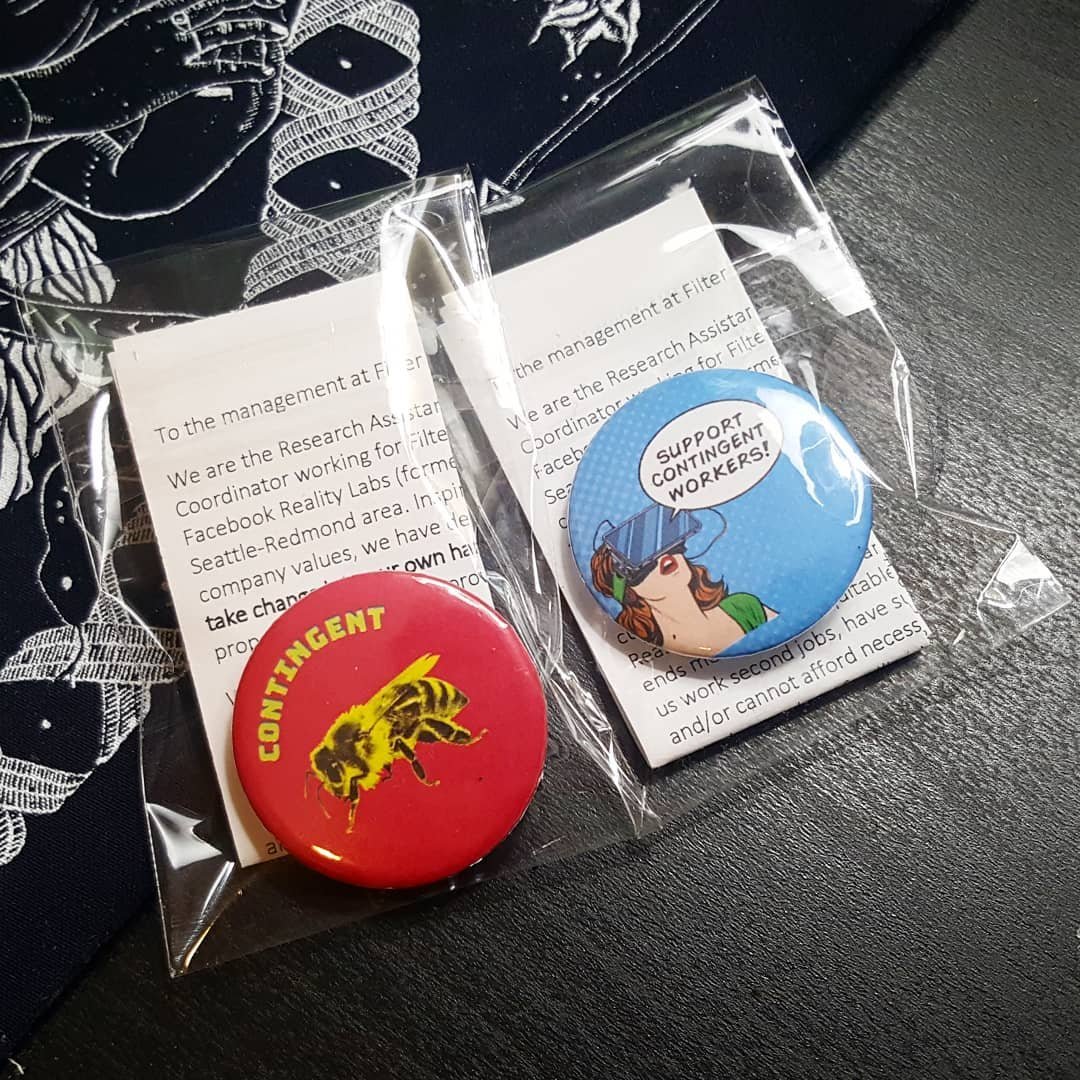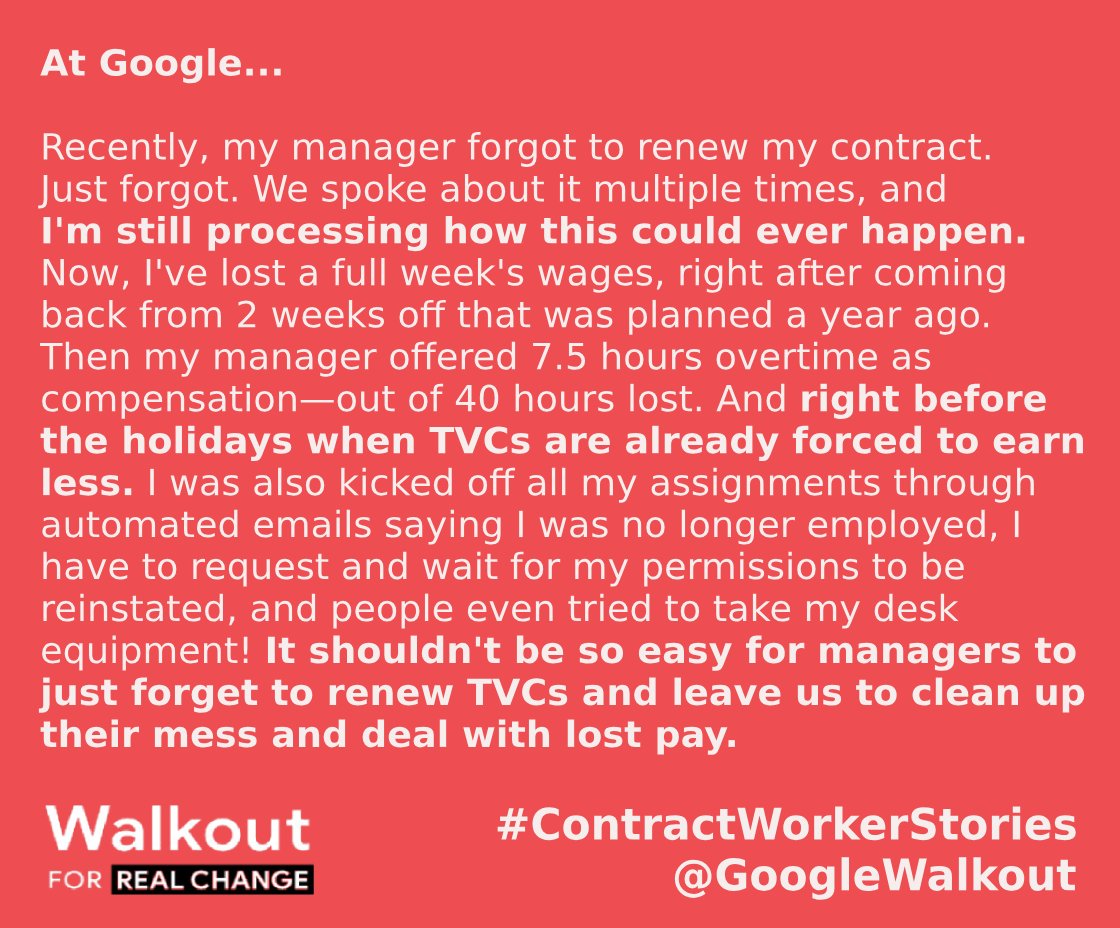Issue 30: Facebook Contingent Workers Beat Back Threats, Lead The Path Forward
21 Dec 2018
Twenty workers subcontracted with Facebook through a UX contracting firm, Filter, submitted this letter on December 6, in an effort to exercise their legal right to negotiate for better wages and conditions at work. (Read the full letter here.)
December 6, 2018
To the management at Filter Digital:
We are the Research Assistants and Program Coordinator working for Filter Digital on-site at Facebook Reality Labs (formerly Oculus Research) in the Seattle-Redmond area. Inspired by Filter’s own company values, we have decided to be courageous and take change into our own hands by standing together in proposing changes to improve our working conditions.
We take pride in the vital contributions we make to the cutting-edge AR/VR research taking place at Facebook Reality Labs. However, we are also struggling to make ends meet without equitable pay and benefits. Many of us work second jobs, have subpar living arrangements, and/or cannot afford necessary medical care for ourselves and our families. We barely make enough to cover our necessary living expenses, let alone contribute to any savings. Many are simply one emergency away from possible homelessness. …
Filter management responded with coercive 1-on-1s with the research assistants, and then on Wednesday of this week emailed an ultimatum to the workers that they could take Filter’s proposed contract as is—or not have a job in 2019.
The letter writers, as well as full time workers who supported their campaign, felt some fear in the face of this retaliation, particularly when their jobs were directly threatened. Still, their confidence was unwavering—their campaign for a better life at work was protected by the National Labor Relations Act. Whether management knew their rights under the law or not, they were desperate for change.
As of today, after full-time employees and the public learned more of the contingent workers’ story and rallied around their campaign, Filter Digital backed down from their threat that the research assistants would lose their job in 2019 (in an impressive display of gaslighting, claiming the Friday deadline to sign Filter’s proposed contract was “not an ultimatum”), but they haven’t agreed to the changes that workers asked for in the first place. The research assistants are asking for basic dignity that all workers deserve like a living wage, paid vacation time, and sick time. For Facebook, a company that made $5 billion in profits last quarter, nobody in their workplace should be on the brink of homelessness or working more than 1 job to make ends meet, regardless of employment status.
The Facebook Reality Labs research assistants’ story is the latest in an ongoing pattern of dividing the workplace into full time employees (FTEs) and temporary or contract workers, with most abuses falling on the latter. Companies rely on workers not talking enough to realize what’s going on, but that is changing every day. FTEs have been fighting back in solidarity. They are increasingly building relationships and sharing stories of the working conditions of all their coworkers, and they aren’t remaining silent when they see something wrong.
These contract workers, like those working throughout the industry, are at the forefront of many labor struggles throughout the industry. Their courage inspires us all to stand behind them. If Filter or Facebook think they can get away with retaliation, let’s prove them wrong. In a post to Facebook FTEs, the research assistants wrote, “Please don’t forget about us over the holiday break, keep sharing with each other what’s going on with our jobs, ask questions, and help us safely continue our work into next year.” That’s something all of us in tech can do, to ensure contract workers can’t be abused by their employers and the tech companies that contract to them.

Buttons worn by full time employees and contractors supporting the fight for improved working conditions
Upcoming Events
Seattle Learning Club: The Revolution Will Not Be Funded
Saturday, 1/5 3PM at The Seattle Public Library University Branch in Seattle
TWC Seattle Monthly General Meeting
Thursday, 1/10 6:30PM at Seattle Labor Temple Association in Seattle
The New Tech Worker Movement: What’s Next?
Friday, 1/11 7PM at Verso Books in Brooklyn
Facebook
The Code of Conduct is in effect at all TWC events.
In The News
“At first I didn’t understand why everyone was so defensive, glum, and sullen at this otherworldly workplace. But I soon learned the reason came down to deep inequality.” Former and current contractors are coming out of the woodworks with stories of wearing the “red badge of courage” and what it’s like to be an outsider inside of Google. Follow #ContractWorkerStories for forthcoming stories.
Facebook continues to plumb the depths of privacy scandal after scandal. One critic implores Facebook workers to step up as the only ones who can hold Facebook accountable.
The NAACP rejected a donation for Facebook and called for a week-long boycott that started Tuesday, saying ““Facebook’s engagement with partisan firms, its targeting of political opponents, the spread of misinformation and the utilization of Facebook for propaganda promoting disingenuous portrayals of the African American community is reprehensible.”
The Independent Workers Union of Great Britain celebrated a major victory over Uber on Wednesday with a Court of Appeals decision that drivers are considered employees.
Amazon warehouse workers in Germany are on strike, promising to delay Christmas deliveries if demands to improve working conditions go unmet.
Last Friday in a suburb of Minneapolis, hundreds marched on an Amazon warehouse demanding that management “improve working conditions, allow for religious expression, create a fund that addresses racial disparities in the community and set up an independent review body for HR complaints.”
More than 12 stock-holding Amazon workers filed identical shareholder resolutions laying out a climate plan for the company; the resolution will be voted on at Amazon’s annual shareholder meeting next spring.
A new data visualization project from Amnesty International called Troll Patrol demonstrates that “Twitter is a place where racism, misogyny and homophobia are allowed to flourish basically unchecked.”
A Sheryl Sandberg and “Lean In” history, retold. “Lean In doesn’t work in a post-#MeToo world where you start talking about the fact that corporations are propping up and run by harassers and abusers.”
Square has leased Uptown Station in Oakland, called “one of the city’s biggest real estate deals ever.” The space is large enough for about 2,000 employees, and was formerly owned (though never occupied) by Uber.
Blind, the app-based anonymous social network for bitching about work has “left one of its database servers exposed without a password, making it possible for anyone who knew where to look to access each user’s account information and identify would-be whistleblowers.”
Add this to your organizing 101 toolkit: The art of the 1on1 is its “emotional interplay between two humans which moves them both to a higher level of understanding. It is not developing a laundry list of problems, or a brainstorm of action steps. The 1on1 is a scalpel which slices to the core of a worker’s issues and reveals their significance and intensity. It is the dangerous and vulnerable act of listening to someone’s heart”.
Year in review: The labor movement has officially arrived to the tech industry. It’s worth stating the grassroots movement in the tech space isn’t happening in a vacuum. Far from it. The past 12 months have seen mass actions from Marriott Hotel workers, fast food employees, and incarcerated Americans in over a dozen states. In education, successful wildcat strikes by West Virginia teachers bred similar actions of varying scale in Oklahoma, Arizona, Kentucky, Colorado, and North Carolina; graduate students led walkouts at Columbia and the University of Illinois while others joined unions, like at Harvard, Tufts, and Brandeis; Harvard cafeteria workers and healthcare workers at the University of California initiated strikes for better pay and conditions. Las Vegas hospitality workers authorized what would have been a city-wide strike in May, as did hundreds of thousands of Teamsters in the ranks of the UPS less than a month later. To see Americans demanding dignity in their work in an industry highly resistant towards employee organizing feels like a monumental shift in power. These may be some of the richest, most influential, and most powerful companies in history, but they still have a hell of a fight on their hands.
History’s Highlight
The fight of tech contractors in the 1990s
During the 1990s, disgruntled contract workers at Microsoft waged a series of campaigns to better their marginal and precarious positions in the tech industry. A key catalyst was an investigation by the IRS in 1990 that found that Microsoft was misclassifying employees as temporary contract workers, denying them standard pay and benefits. Misclassified contract workers sued Microsoft to get these benefits, in Vizcaino vs. Microsoft Corp., which resulted in a $97 million settlement in December 2000. Microsoft contract workers also became the base for the Washington Alliance of Technology Workers (WashTech), founded in 1998 to help organize workplace campaigns and public advocacy. In 1999, a group of contract accountant-programmers at Microsoft’s TaxSaver department declared their intention to unionize with WashTech and fight for pay equity, benefits, and reclassification. Unfortunately, the union drive stalled, and Microsoft shut down the whole department a year later. But the workers still managed to win most of their demands in the meantime by engaging in workplace organizing and shop-floor actions.
Song Of The Week
John O’Connor CARPAL TUNNEL HD 720p
Early in the morning at the start of the day
I force my fingers ‘round the handle of the blade
Start in to cuttin’ just as fast as I can
By the end of the day I can hardly move my hands
I got that old carpal tunnel and my hands won’t move
But the foreman tells me to stay in the groove
You cut that cattle as fast as I do
You’ll get that carpal tunnel too
Now I’ll go in for an operation once more
But I’ll come right back to the killing floor
And I’ll tell them darling children of mine
“Don’t you ever go to work on the packinghouse line
